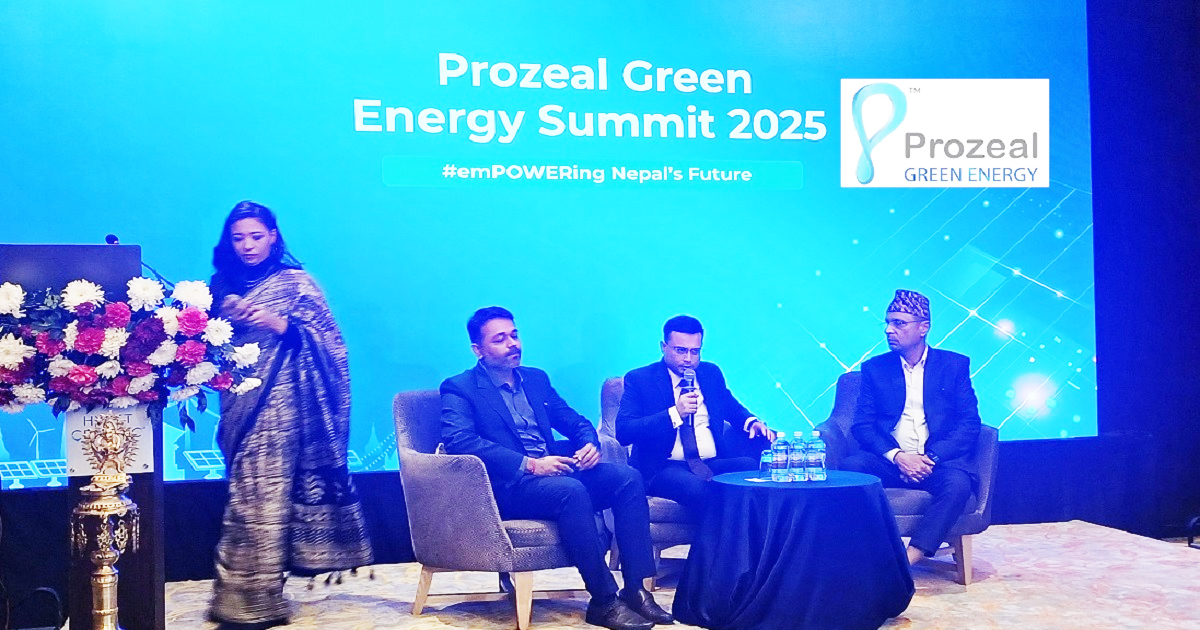
Kathmandu: Nepal's Golyan Power Limited and Prozeal Green Energy Limited (an India-based company) have initiated a collaboration with the goal of generating 500 MW of solar energy within the next two years. Together, these companies have established Prozeal Green Energy Nepal to jointly develop solar energy projects. The announcement of their partnership was made on Wednesday during the “Prozeal Green Energy Summit 2025” in Kathmandu.
At the event, Dr. Ram Prasad Dhital, Chairman of the Electricity Regulatory Commission (ERC), emphasized the significance of this collaboration in achieving the government’s recently unveiled 'Energy Development Roadmap, 2081'. While targeting 28,500 MW of electricity generation, he stressed the importance of energy diversification, noting that this partnership would contribute to the energy mix. “Large-scale energy production requires proportional resources, and the ERC is striving to play an effective role in this,” he said. He added that the ERC has recently launched an online Document Management System (DMS) to streamline services for producers and enhance efficiency.

Ganesh Karki, President of the Independent Power Producers’ Association, Nepal (IPPAN), welcomed Golyan Group’s collaboration with Prozeal to achieve the ambitious target of generating 500 MW of solar power. He pointed out that while the Government of Nepal (GoN) has set clear targets for hydropower development, there has been a lack of clarity regarding solar power. He also expressed concern over the litigation surrounding the 960 MW solar energy contract advanced by the Nepal Electricity Authority (NEA). He urged the government to take decisive actions on critical issues, such as land acquisition, which remains a major challenge for solar power projects.
Similarly, Sandeep Shah, President of the Solar Energy Producers’ Association Nepal, highlighted the growing challenges facing hydropower due to climate and weather variations. He noted that floods and landslides have caused significant damage to hydropower projects, and declining water flow in rivers has resulted in most run-of-river (ROR) projects operating at less than 20% capacity. He also observed that advancements in technology and reductions in costs over the past five years have made solar power a more viable and effective option.

According to Shah, in line with the energy mix concept, 10% of the country’s installed capacity of 3,500 MW (or 350 MW) should ideally come from solar energy. However, Nepal has only achieved 106 MW so far. He attributed the slow progress to the lack of consistent the GoN's policies.
Similarly, Akshay Golyan, Director of Golyan Group, stated that as long as the sun shines, the future of solar power remains bright, underscoring the importance of prioritizing solar power development. Likewise, Pravin Aryal, Director of Prozeal Green Energy Nepal, noted that the partnership with Prozeal would play a crucial role in providing affordable, reliable, and clean energy in Nepal. He described the collaboration as a milestone for Nepal’s energy transformation.
Sobit Rai, Managing Director of Prozeal India, shared that the company, established in 2013, has already developed over 2 GW of renewable energy projects across 18 states in India. He highlighted Prozeal’s expertise in solar energy, hybrid renewable energy, and green hydrogen production. Additionally, he mentioned that Prozeal is currently advancing five solar energy projects in Nepal, including those with the NEA and Reliance Spinning Mills.